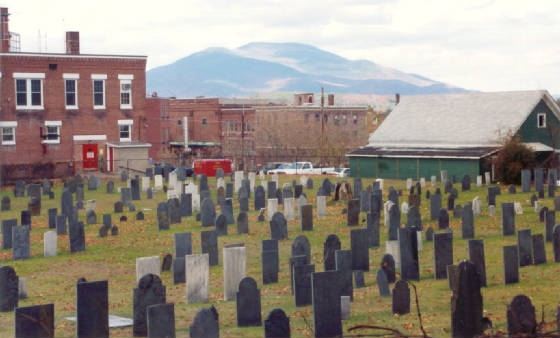
Since the late summer, I have been exploring the towns and small cities in the Connecticut River Valley in southern Vermont and New Hampshire. On a recent November morning in Claremont, New Hampshire, I was walking in a modest neighborhood that is bordered by three large mills, and whose character is defined by a Catholic church, rectory, school and convent. The day was warm and sunny, a welcome dose of Indian summer. I spotted a woman digging in her tiny front yard. She looked up and smiled.
“Good morning,” I said. “You have a nice neighborhood here.”
“It looks nice now, but winter is coming,” she warned, and introduced herself as Marylou. “That’s why I’m planting these tulips. I planted 32 of them last fall, and 31 of them came up. Planting them gives me hope. The winter is long, but I can sit by my window and wait for the tulips to come up again.”
November is a tough month. Brown leaves blow around in the chilly wind, the sun starts to fade in mid-afternoon, and a spiritual grayness sets in. Hope is suddenly not part of our vocabulary.
At first glance, Claremont seemed to be stuck in November. Behind the long row of brick mills that borders the north side of downtown, the Sugar River thundered down from several dams, powered by three days of almost constant rain. The factory buildings, some partially occupied, most vacant, were sad reminders of the town’s seemingly endless struggle to recover from the loss of its paper and textile industry.
Across the river, on hilly North Street, one can look down from a small visitors center and see all of the mills looking like one long brick wall. Down the hill behind the center, I walked along the river in an area once occupied by a large factory. What’s left are weeds, grass, and several concrete foundations. But the view was haunting, and the sound of the falling water was almost deafening. Looking across the river, I spotted some nostalgic advertising signs painted on the tall downtown buildings; and to the west, Mt. Ascutney filled the landscape, bright orange in the late-morning sun.
On the north side of Tremont Square, which serves as a roundabout for traffic, the historic and huge Moody Block stands among several smaller blocks, and towers over the adjacent Tumble Inn, a well-preserved Worcester Diner. To the east is the Claremont Opera House, which occupies the upper floors of the city hall. And to the south, Pleasant Street boasts several blocks of familiar turn-of-the-century buildings, many of them architectural gems that need restoration, including an Art Deco movie house.
After a terrific lunch of flapjacks at the Tumble Inn, and several hours of roaming the streets and talking to some folks, this little city of 14,000 residents surprised me.
The Opera House has a successful performing arts program, and a quick walk up the stairs revealed a gorgeously restored Victorian theater. The once-elegant Moody Block has recently been purchased by a developer who promises to bring it back to at least some of its glory. And according to Alicia Beck, the new executive director of Main Street Claremont, Inc., one of the blocks on Pleasant Street is being restored under the city’s first historic preservation grant.
At the visitors center, a woman told me that one of the largest mills is being redeveloped, and another mill is occupied by state offices. She added that the vacant area along the river might someday become a river walk and recreational area, if the city can get the funding. Despite the oncoming winter, there is hope in Claremont. Marylou is planting tulips.
Winter, poem by Joe Manning
Spring rolls through, no time to kill.
Summer’s sweet but fleeter still.
Fall is swift, but so sublime.
Winter always takes its time.